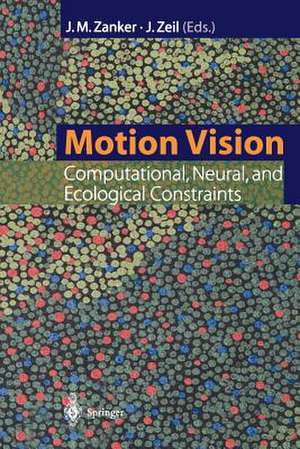Motion Vision: Computational, Neural, and Ecological Constraints
Editat de Johannes M. Zanker, Jochen Zeilen Limba Engleză Paperback – 26 sep 2012
- Early Motion Vision - Motion Signals for Local and Global Analysis - Optical Flow Patterns - Motion Vision in Action - Neural Coding of Motion - Motion in Natural Environments
Each topic is introduced by a keynote chapter which is accompanied by several companion articles. Written by an international group of experts in neurobiology, psychophysics, animal behaviour, machine vision, and robotics, the book is designed to explore as comprehensively as possible the present state of knowledge concerning the principal factors that have guided the evolution of motion vision.
| Toate formatele și edițiile | Preț | Express |
|---|---|---|
| Paperback (1) | 934.01 lei 6-8 săpt. | |
| Springer Berlin, Heidelberg – 26 sep 2012 | 934.01 lei 6-8 săpt. | |
| Hardback (1) | 938.66 lei 6-8 săpt. | |
| Springer Berlin, Heidelberg – 25 oct 2000 | 938.66 lei 6-8 săpt. |
Preț: 934.01 lei
Preț vechi: 1139.03 lei
-18% Nou
Puncte Express: 1401
Preț estimativ în valută:
178.84€ • 184.49$ • 148.23£
178.84€ • 184.49$ • 148.23£
Carte tipărită la comandă
Livrare economică 20 februarie-06 martie
Preluare comenzi: 021 569.72.76
Specificații
ISBN-13: 9783642629792
ISBN-10: 3642629792
Pagini: 412
Ilustrații: XII, 397 p.
Dimensiuni: 155 x 235 x 22 mm
Greutate: 0.58 kg
Ediția:Softcover reprint of the original 1st ed. 2001
Editura: Springer Berlin, Heidelberg
Colecția Springer
Locul publicării:Berlin, Heidelberg, Germany
ISBN-10: 3642629792
Pagini: 412
Ilustrații: XII, 397 p.
Dimensiuni: 155 x 235 x 22 mm
Greutate: 0.58 kg
Ediția:Softcover reprint of the original 1st ed. 2001
Editura: Springer Berlin, Heidelberg
Colecția Springer
Locul publicării:Berlin, Heidelberg, Germany
Public țintă
ResearchDescriere
In six parts, this book considers the extent to which computational, neural, and ecological constraints have shaped the mechanisms underlying motion vision:
- Early Motion Vision - Motion Signals for Local and Global Analysis - Optical Flow Patterns - Motion Vision in Action - Neural Coding of Motion - Motion in Natural Environments
Each topic is introduced by a keynote chapter which is accompanied by several companion articles. Written by an international group of experts in neurobiology, psychophysics, animal behaviour, machine vision, and robotics, the book is designed to explore as comprehensively as possible the present state of knowledge concerning the principal factors that have guided the evolution of motion vision.
- Early Motion Vision - Motion Signals for Local and Global Analysis - Optical Flow Patterns - Motion Vision in Action - Neural Coding of Motion - Motion in Natural Environments
Each topic is introduced by a keynote chapter which is accompanied by several companion articles. Written by an international group of experts in neurobiology, psychophysics, animal behaviour, machine vision, and robotics, the book is designed to explore as comprehensively as possible the present state of knowledge concerning the principal factors that have guided the evolution of motion vision.
Cuprins
Processing Motion in the Real World.- I: Early Motion Vision.- Direction-Selective Ganglion Cells in the Retina.- Identification of Mechanisms Underlying Motion Detection in Mammals.- Pathways in Dipteran Insects for Early Visual Motion Processing.- II: Motion Signals for Global and Local Analysis.- The Organization of Global Motion and Transparency.- Combining Local Motion Signals: A Computational Study of Segmentation and Transparency.- Local and Global Motion Signals and their Interaction in Space and Time.- III: Optical Flow Patterns.- Extracting Egomotion from Optic Flow: Limits of Accuracy and Neural Matched Filters.- A Closer Look at the Visual Input to Self-Motion Estimation.- Visual Navigation: The Eyes Know Where Their Owner is Going.- IV: Motion Vision in Action.- The Role of Inertial and Visual Mechanisms in the Stabilization of Gaze in Natural and Artificial Systems.- Gaze Control: A Developmental Perspective.- Does Steering a Car Involve Perception of the Velocity Flow Field?.- V: Neural Coding of Motion.- Neural Encoding of Visual Motion in Real-Time.- Real-Time Encoding of Motion: Answerable Questions and Questionable Answers from the Fly’s Visual System.- A Comparison of Spiking Statistics in Motion Sensing Neurones of Flies and Monkeys.- Dynamic Effects in Real-Time Responses of Motion Sensitive Neurones.- VI: Motion in Natural Environments.- Towards an Ecology of Motion Vision.- Spatiotemporal Inseparability of Natural Images and Visual Sensitivities.- Motion Adaptation and Evidence for Parallel Processing in the Lobula Plate of the Bee-Fly Bombylius major.
Textul de pe ultima copertă
In six parts, this book considers the extent to which computational, neural, and ecological constraints have shaped the mechanisms underlying motion vision:
- Early Motion Vision - Motion Signals for Local and Global Analysis - Optical Flow Patterns - Motion Vision in Action - Neural Coding of Motion - Motion in Natural Environments
Each topic is introduced by a keynote chapter which is accompanied by several companion articles. Written by an international group of experts in neurobiology, psychophysics, animal behaviour, machine vision, and robotics, the book is designed to explore as comprehensively as possible the present state of knowledge concerning the principal factors that have guided the evolution of motion vision.
- Early Motion Vision - Motion Signals for Local and Global Analysis - Optical Flow Patterns - Motion Vision in Action - Neural Coding of Motion - Motion in Natural Environments
Each topic is introduced by a keynote chapter which is accompanied by several companion articles. Written by an international group of experts in neurobiology, psychophysics, animal behaviour, machine vision, and robotics, the book is designed to explore as comprehensively as possible the present state of knowledge concerning the principal factors that have guided the evolution of motion vision.
Caracteristici
A multi-disciplinary discourse about one of the most crucial aspects of vision: motion detection and neuronal processing.










